
Lee Jung-eun, journalist, in Dong-a Ilbo (April 28, 2022)
Summary by Paul Forien (Photo credit: Yonhap)

The Fulbright Program is one of the best foreign policy initiatives of the United States, according to Ahn Byung-man, a leading academic who served as minister of education, science and technology from 2008 to 2010. Among the Fulbright scholars are 61 Nobel Prize laureates, 89 Pulitzer Prize winners, 40 heads of state or government, and over 100 key Korean public figures.
The fairness of the selection process, however, has been under scrutiny since revelations emerged about Kim In-chul, a candidate for the position of education minister and deputy prime minister for social affairs, and how he and then four of his family members had received scholarships in the past. A government review board is looking into the selection process of the Fulbright and another scholarship scheme. The public wants Kim’s nomination withdrawn. (The administration of President Yoon Suk-yeol did eventually do so in early May, making Kim the first nominee of the new government to step down before confirmation.)
The Fulbright Program has a strong diplomatic dimension and promotes better understanding between the United States and other countries. Students who have never been to the United States or have not been exposed to American culture are given priority in selection over students who have experience living in the US. All attributes being equal, the scholarship will be given to the person who has not experienced life there. Yet, Kim's son and daughter, who had lived in the US before, both won the scholarship.
Did a student's dreams did not come true because the Kim family and their associates shared the scholarships among them? This situation is not only embarrassing for Korea but also for the 160 other countries around the world that participate in this program.

Rafsan Ghalib, editorial assistant, in Prothom Alo (August 12, 2023)
Summary by Alejandro Reyes (Photo credit: Facebook)

A large area of Chittagong city, almost half of it, has been submerged in water due to continuous rains. People are posting photos of the drowned areas on Facebook with the names of different rivers or cities in Bangladesh but which are called "European". There is now a viral meme on social media of the Bengali cinema hero Riaz standing in the middle of a river, holding a huge cut fish. There is no end to the posting of this image. The name of Riaz has now become synonymous with the flooding of Chittagong. But why?
The origin goes back to the participation of hero Riaz and other actors and personalities in the last mayoral campaign. They came from Dhaka and traveled around in open trucks and campaigning for the Awami League candidate. Riaz lauded the road on which they came to Chittagong, saying that it did feel like a road in Bangladesh but more like one in Europe. Yet he must have seen the conditions of other roads in the city and the chaos on the streets. As one commentator put it, how could he compare Chittagong’s roads with Europe from just one example? People are making fun of Riaz because of this. He has become a source of laughter, a meme.
City expansion, residential area construction and development projects have destroyed so much of Chittagong by cutting one hill after another, resulting in flooding many times every year. One schoolteacher said: “The roads may be like in Europe to hero Riaz, but not to me. We the people, who suffer from floods every year, know [the reality]. The hero has become a villain to some people.”

Eternity Uwaifo, journalism student, in Island Times (August 11, 2023)
Summary by Alejandro Reyes (Photo credit: Luis Enrique Ascui/ADB)

Countries and companies could soon begin extracting rare metals used in a range of consumer electronics from the seabed floor on an industrial scale – something not previously allowed under international law. In a study of the potential overlap between key fisheries and deep-sea mining in a region of the Pacific Ocean, researchers found that three tuna populations are set to increase in this region by an average of 21 percent by mid-century. Conflict could result between the extractive and fishery industries – with the risk of substantial environmental and economic impact.
The researchers looked at projected tuna biomass increases in a region of the Pacific between Hawaii and Mexico. They used previously published projections of climate impact on the distribution and abundance of the three most commercially important Pacific tuna species. Bigeye, skipjack and yellowfin are expected to increase by an average of 21 percent under both medium and high greenhouse gas emissions pathways. This suggests that tuna will move to this zone “regardless of the climate-change scenario”, according to the researchers. They add that the interactions between deep-sea mining, fish populations and climate change are “complex and unknown”.
But the projected increased overlap between eastern Pacific tuna fisheries and deep-sea mining areas could result in “increasing conflict” – alongside the other environmental and economic impacts in a “climate-altered ocean”.
More information on the ecology of the open ocean is needed before potentially damaging activities such as deep-sea mining are allowed. With the climate and biodiversity crises unfolding right in front of us, it is critical to consider whether a new industry is really needed. If it is, then it is necessary to be sure that it bears the costs of its environmental impact rather than saddle the burden on nations that can least afford to pay.

Rio R Bunet, biodiversity specialist and conservationist, in Tempo (August 12, 2023)
Summary by Alejandro Reyes (Photo credit: WWF-Indonesia)

Happy World Elephant Day! Elephant evolution has gone through various stages and challenges from extreme climatic conditions of the ice age to human conquest. Currently, the lives of elephants are threatened due to deforestation, habitat degradation, poisoning, hunting and trading of their ivory, as well as the risk of inbreeding because of shrinking habitat pockets. All these risks are leading to extinction.
Various conservation efforts have been made to prevent elephants from becoming extinct. But will they survive? Asian elephants are found in South and Southeast Asia, surviving but with their populations in decline. In 1989, there were between 34,500 and 53,700 of them in the region. In Indonesia, the government has an urgent action plan to save the Sumatran elephant population from the threat of poaching, elephant-human conflict and unnatural deaths due to snaring, poisoning and the installation of high-voltage electric fences, all making elephants a critically endangered species.
The anatomical evolution of elephants over ten thousand years and their cognitive development over generations underscore how they are simply refusing to become extinct. Humans as stewards of biodiversity on earth should protect them.

Kim Hyun-joo, writer and caregiver, in Ulsan Press (August 3, 2023)
Summary by Alejandro Reyes

Parents who once cared for their children are now elderly and most of them are in a nursing facility with dementia. An elderly man, who had a strong appetite, stopped eating one day and showed no appetite at all. Due to his poor health, he was admitted to hospital. A few weeks later, he was discharged. He felt bad again, but was told he had to wait a day for a bed. In the end, he did not return to the nursing home; he had ended his life.
We have to take care of the elderly under any circumstances, without having time to grieve over any one death. Caring for the elderly is physically and mentally difficult. The minimum-wage pay means that there is a high rate of resignations or turnover. When you go to bed tired, sadness secretly stimulates your tears. For me, it is not that the job is not hard but that it is worth the effort. Someone must do it and have a sense of duty to care for the elderly. The human rights of the elderly are of the utmost importance.
Some including caregivers themselves dismiss the work of caregivers as simple labor. There are many guardians of the elderly who are extremely considerate of caregivers. It is very fortunate that there are those who bring us bread, fruit, soap and other items when visiting their relatives. The items are not important, but we are so grateful to receive them. We will all go through the natural process of leaving this world someday. In the long road of life, you do not know where you are coming from or where you are going. But I hope that it is a time when everyone thinks deeply about parents and filial piety.

Tarcisius Kabutaulaka, associate professor at the University of Hawaiʻi at Māno, in Solomon Times (July 26, 2023) – originally published in Devpolicy Blog
Summary by Alejandro Reyes (Photo credit: Foreign Ministry of the People's Republic of China)

Geopolitical competition can have adverse impact on third-party countries such as Solomon Islands.
On one side are those who perceive China (and its flotilla of state officials, companies, citizens and investors) as a savior and its intentions as purely benevolent and infallible. They highlight the role of the Chinese state and Chinese companies in infrastructure developments. But they often do not mention that while most of these projects were built by Chinese contractors, they were financed by other funding agencies such as the World Bank and the Solomon Islands government.
On the other side of the debate are those who dislike China because they see it as a one-party communist dictatorship. They highlight its suppression of minorities such as Uyghurs, and the corruptive influence of Chinese entrepreneurs, and they accuse Beijing of being anti-Christian. They contrast this to the US and other Western countries that they consider as hallmarks of liberal democracy. They present China as a monolithic entity with total control by the Chinese Communist Party, despite the complex web of Chinese actors with sometimes differing interests. This group is generally uncritical of Western countries’ colonial histories. They are vehemently anti-China and wear it as a badge of honor.
These groups with differing opinions “shout” at each other, mostly on social media. This has caused divisions that are socially corrosive. There is a middle ground for constructive conversation. This should emphasize how the Solomon Islands government could manage its engagements with competing global powers in ways that would ensure the interests of Solomon Islands are privileged. Solomon Islands must not become a tributary state of others. All development partners are important. But most fundamental is the wellbeing of Solomon Islanders. It is therefore important that Solomon Islanders find a middle ground to discuss their country’s relationship with global powers.

Hareem Sumbul Bari, certified lactation consultant, in Dawn (August 5, 2023)
Summary by Alejandro Reyes (Photo credit: Saiyna Bashir/UNICEF Pakistan)

World Breastfeeding Week (August 1-7) is upon us. This year, the governing theme is “Enabling breastfeeding: making a difference for working parents”. Maternity leave in Pakistan was 90 days of paid leave but the recent Maternity and Paternity Act, 2020, gives us 180 days for the first child, 120 days for the second and 90 days for the third child from the date of inception. It also has a clause for paternity leave. This comes as a great relief for working parents if they have been able to initiate breastfeeding and are to hold on to it for as long.
Breastfeeding is natural but it may not come naturally to a new mother. It is indeed a skill that like any other needs to be learnt and taught. Pakistan is teetering at the edge with a 15pc breastfeeding initiation rate despite our very strong religious and social inclinations to want to breastfeed. At this rate, most parents will not be breastfeeding once they return to work. To enable breastfeeding for working families, we must ensure they are breastfeeding in the first place. They need to be supported with lactation-trained and skilled professionals before birth and for as long as their breastfeeding journey lasts.
Every medical practitioner they come into contact with should have at least a basic understanding of lactation so as to not inadvertently jeopardize the patient’s breastfeeding journey. Then perhaps we will have more parents returning to work and being able to continue to breastfeed. Having said that, many mothers even today are cut short in the effort, because of lack of support at work and home once their maternity leave ends. I cannot stress enough that breastfeeding is not a one-person job. It is the responsibility of the community to preserve it.

Alex Magno, political scientist, in his First Person column in The Philippine Star (July 29, 2023)
Summary by Alejandro Reyes (Photo credit: AccuWeather)
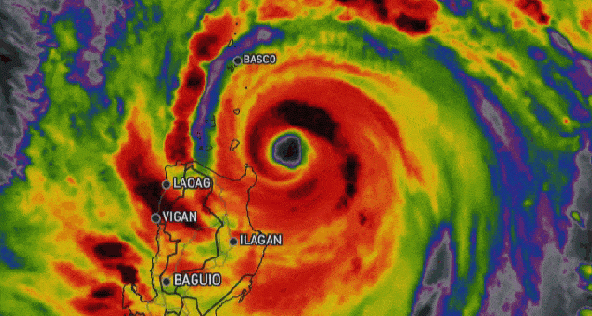
The only upside to the calamity that was Typhoon Egay (known internationally as Doksuri) was that our drying dams were refilled with rainwater. The renewed supply is not going to last us very long, however. Angat Dam in Bulacan, which supplies 97 percent of all of Metro Manila’s potable water, rose by three meters. Before the typhoon struck, water in this dam had fallen below the minimum operating level of 180 meters above sea level (MASL). No water for irrigation was available and the water concessionaires for the metropolitan area warned of rationing.
Nearly all the river systems in central and northern Luzon burst their banks, causing massive flooding. Large farming areas were flooded, leading to loss of crops. Several landslides happened and several roads were cut. All these were par for a super typhoon.
Our disaster response was adequate, if not exemplary. The time and resources we all invested in disaster risk mitigation were not wasted. We must continue this work since climate change will likely bring even more extreme weather in the future.
Without doubt, we need more dams to store our water and help us generate electricity. They will capture water that otherwise uselessly flows out to the ocean. Water for household use is one thing. We also use water for our agriculture and our industry. Rice, our staple crop, uses tremendous amounts of water. Current farming methods require our rice paddies to be submerged. Our paddies yield a lot of water to evaporation, especially during the hot and dry months. It will even be more expensive to pump out water from our aquifers, considering high power prices. Besides, our aquifers have already been overexploited. It will take thousands of years to refill them.

Lai Tung-kwok, retired civil servant who served as secretary for security of Hong Kong from 2012-17, in am730 (July 31, 2023)
Summary by Alejandro Reyes (Photo credit: Gregg Webb/IAEA)

In March 2011, Japan suffered the worst earthquake and tsunami disaster in history, resulting in the Fukushima nuclear power plant accident. Twelve years after the accident, the Japanese government suddenly and unilaterally announced plans to discharge the nuclear wastewater from the nuclear disaster into the Pacific Ocean.
The Japanese government claims that various security measures have been taken to ensure that the discharge of nuclear wastewater does not cause any harm to the environment and human health. The International Atomic Energy Agency (IAEA) has released a report on Japan's nuclear wastewater discharge program saying that it is in compliance with international safety standards. Some experts have questioned the report. Liu Senlin, a Chinese nuclear energy expert, said in an interview that the IAEA had not fully studied the opinions of all experts before issuing the report and had not fully consulted with opponents to the Japanese move.
Despite protests by several countries, international organizations and civil society groups, the Japanese government has persisted in advancing its plans. The Hong Kong Special Administrative Region Government has announced that it will ban the import of aquatic products from the ten prefectures in Japan once Tokyo initiates the wastewater discharge. These measures are designed to protect the health and safety of Hong Kong citizens and are a responsible response to the matter. Hong Kong Chief Executive John Lee Ka-chiu said Hong Kong would restrict imports of Japanese food and conduct more inspections to ensure that imported products did not pose any harm to the health of Hong Kong citizens.
The Japanese government is insisting on discharging nuclear wastewater into the ocean. The international community should further strengthen cooperation and coordination, monitoring the Japanese emissions, to ensure that the global economic environment and human health are safeguarded.
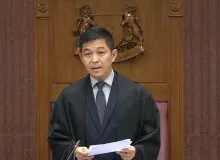
Ang Yiting, assistant editor-in-chief, in Lianhe Zaobao (July 30, 2023)
Summary by Alejandro Reyes (Photo credit: Gov.sg)
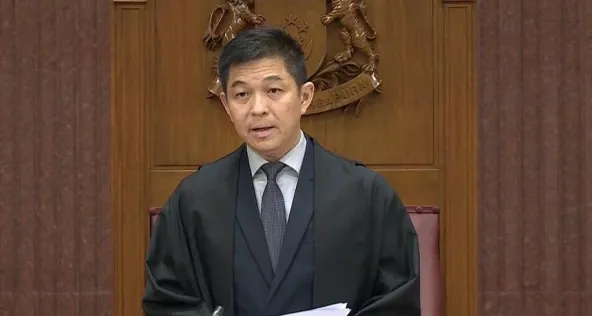
The most intriguing thing about the two politicians – Nicole Seah Xue Ling of the Workers’ Party (WP) and the Speaker of Parliament Tan Chuan Jin of the ruling People’s Action Party (PAP) – resigning from their parties is not the coincidence and the consequences but that they both involved extramarital affairs. The leaders of their respective parties learned of both romances after the 2020 general election but the situations dragged on for nearly three years before they were revealed.
Why did both parties delay in bringing these matters to light? When it concerns the moral integrity of the people’s representatives, does not the party leadership feel the need to investigate and verify the situation? The two camps did not delve into the details and that has been criticized.
Going deeper into the statements by the respective party leaders, it is possible to understand their thinking. Extramarital affairs are wrong but the final straws that prompted both parties to accept their resignations were not the affairs themselves. Prime Minister Lee Hsien Loong, as secretary general of the PAP, only made the truth public because he wanted to ensure that the needs of the speaker’s constituency were properly handled. The crucial issue was that the speaker kept making mistakes. The problem with Seah was her behavior when being questioned by her party’s leadership.
Do our politicians have to be flawless? If there is no crime or deviation that is harmful to the public interest and the mistake has been corrected, can we be tolerant or be lenient if the person is conscientious? It has always been taboo for politicians to be unruly in their private lives. We cannot abandon the pursuit of the highest moral standards. But when politicians commit mistakes in private, to what extent should they be held accountable?
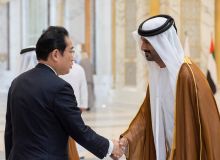
Miyake Kuni, president of the Foreign Policy Institute, research director for foreign and national security affairs at the Canon Institute for Global Studies, visiting professor at Ritsumeikan University, and special advisor to the Cabinet of the Prime Minister of Japan, in The Japan Times (July 20, 2023)
Summary by Alejandro Reyes (Photo credit: UAE Presidential Court)
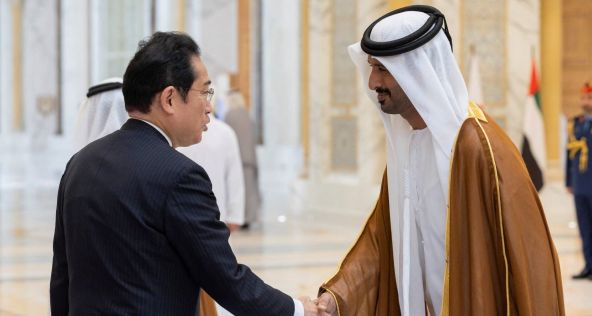
The first visit in three years by a Japanese prime minister to the Gulf Arab states was groundbreaking. The political landscape of the Gulf region has been in flux since then-prime minister Abe Shinzo’s visit to Saudi Arabia, the UAE and Oman in 2020. The trigger was the withdrawal of US forces from Afghanistan at the end of August 2021. Around that time, Israel, Turkey, Iran and the Arab nations in the Middle East instinctively realized that the US’s priority would begin to shift toward the Indo-Pacific region.
They began taking steps to secure more advantageous positions, including making minor adjustments to their respective foreign policies and taking out new insurance policies in order to maximize their national interests on the premise that US politico-military involvement will begin to decline. Examples of this are the normalization of ties between Israel, the United Arab Emirates and other Arab countries – the Abraham Accords – and the Saudi crown prince’s ambitious domestic economic policy and his country’s normalizing of relations with Iran, Syria and Turkey.
Two caveats: First, the US withdrawal from the Middle East is a misconception. In fact, the US forces in the Gulf are not being withdrawn but rather are being reinforced. Second, China’s so-called increasing influence in the Middle East, especially in Saudi Arabia, is merely the result of measures taken by Middle Eastern countries when relations with the US are strained.
This situation, then, is a perfect opportunity for Japan. The more fluid the international relations in the Gulf region become, the more opportunities Japan will have to play a greater political role. It is clear that Japan has begun to make appropriate political moves. It may take time for Japan to expand its role, but now is the time to start such a new approach.

Huy Đăng, journalist, in Tuổi Trẻ (July 22, 2023)
Summary by Alejandro Reyes (Photo credit: Vietnam Football Federation)

Vietnam’s women’s football has had a difficult time. Consider how some of the players have to clean the floors every day where they train, sell bread and lottery tickets to earn a living and then still have to kick like mad when they take to the field. But it is not just in Vietnam that women’s football suffers from injustice. Poverty is not unique to Vietnamese female players. Even in America, girls are constantly fighting for equal rights.
The fight for gender equality in football cannot stop. The truth is that girls have to accept that this is the market. Men’s football has more commercial and audience appeal than the women’s competition. A survey in Japan found that the average speed of the ball in a men’s match is about 20 percent faster than in a women's match.
Perhaps that is why the Fédération Internationale de Football Association (FIFA) has arranged for the Women's World Cup to take place in the summer of odd-numbered years – to avoid coinciding with popular sporting events such as the men’s World Cup or the Olympics.
But there is an element in the women’s game that is completely equal to the men’s – the many touching stories about overcoming difficulties that are even more inspiring than those of their male counterparts. Our female players are skilled, nimble and well-educated – 11 out of the 23 female World Cup players are university students. Captain Huỳnh Như is a "cultural ambassador" who shines brightly when playing in the women's league in Portugal. They are all heroes with inspiring stories.
That is all that needs saying for everyone to stand by our girls, regardless of the outcome of the 2023 Women's World Cup in Australia and New Zealand. Our women’s team will have more beautiful stories to tell and will go on to even greater achievements.

Shyam Saran, Indian foreign secretary from 2004-06 and honorary fellow, Centre for Policy Research, in The Tribune (July 19, 2023)
Summary by Alejandro Reyes (Photo credit: Xu Qin/Xinhua)

On the sidelines of a conference in Beijing, opportunities for conversation with former and current Chinese officials provided a window to the range of Chinese perceptions about India and the prospects for India-China relations. The Chinese continue to insist that the border issue should be only one component in the full range of relations, that it should not be allowed to define their overall character. This is an implicit rejection of the Indian position that the situation on the border is “abnormal” and this cannot but adversely impact bilateral relations.
Despite several agreements to undertake a joint exercise to clarify the Line of Actual Control (LAC), the Chinese have refused to do so. Not clarifying the LAC enables China to play on supposed ambiguities to encroach upon Indian-held territory. Overall, the standoff at the border is likely to continue and there seems to be no prospect of disengagement of the heavy troop deployment on both sides.
My conversations in Beijing took place soon after Prime Minister Narendra Modi’s successful state visit to Washington. Chinese anxiety over progress in the Indo-US relations was palpable. There were concerns that India was becoming part of the US strategy of containing China. One other Chinese complaint was that India had “downgraded” the Shanghai Cooperation Organisation (SCO) by hosting a brief online summit rather than holding an in-person meeting and that this had been done under US influence.
Overall, one had the impression that China was feeling more unsure of itself and felt that India had proved to be adept and agile in advancing its interests. This may be related to pessimism about China’s economic prospects, even as India seems to have become the new destination for capital and technology flow. Does this presage a shift in the stance towards India?

Tan Lee Ooi, academic director, INTI International College Penang, in Sinchew Daily (July 16, 2023)
Summary by Alejandro Reyes (Photo credit: Prachatai)

Mahathir Mohamad, who was Malaysia’s longest-serving prime minister, and other politicians have been chanting the rhetoric of Malay unity. This may seem incredible since Malays make up about 63 percent of the total population so unity has always been the main theme and political weapon in Malaysian politics. Indeed, the degree of unity of the three major ethnic groups in the country has been an important indicator for society since Independence.
Among Chinese, the three key political parties have argued for unity but there have been multiple rounds of back-and-forth among them. For the Chinese community, the call for unity was necessary precisely because of their inability to unite.
Malay society is in a similar situation. There is a wide spectrum of opinion in the community on various issues – between secularization and religiousness, between conservatism and liberalism, between the idea of racial dominance and the goal of pluralism. It is very difficult to reach a common position.
Malay politics will in future face the same uncertainty, fluctuation and hesitation as politics in the Chinese community has in the past. Achieving a decisive victory of one group or party will be hard to achieve. This is because of all the contradictions in this very complex society – differences between rural and urban, rich and poor, and over how to approach religion and ways of living. There is no single political argument that can unite everyone.
Unity within a single ethnic group is absurd. Yet, achieving national unity is the hope of Malaysia.

Muhammad Amir Rana, security analyst, in Dawn (July 16, 2023)
Summary by Alejandro Reyes (Photo credit: PTI)

The member states of the Shanghai Cooperation Organisation (SCO) were displeased with India’s decision to host their summit virtually instead of in person. This decision was widely interpreted as a deliberate strategy to prevent inviting the Pakistani prime minister to Delhi and to convey a message to the US. Furthermore, it was perceived as an effort to transform the SCO into an organization similar to the South Asian Association for Regional Cooperation (SAARC).
The primary objective of establishing SAARC was to enhance economic and cultural cooperation in the South Asian region. It was agreed that the forum should not be utilized for discussing bilateral disputes. This optimistic expectation, however, was shattered as SAARC members blamed India and Pakistan for the failure of the initiative. With the inclusion of India and Pakistan in the SCO, a sense of hope arose that both nations would eventually normalize relations, thereby fostering mutual interdependence. The SCO’s potential for collaboration in security and counterterrorism was seen as an opportunity to influence the Pakistan-India relationship positively. Unfortunately, both countries have so far let down the Central Asian states, Russia and China.
India has been accused of using the SCO platform for political purposes. The last virtual forum, in which Indian Prime Minister Narendra Modi repeated his allegations of cross-border terrorism and that the China-Pakistan Economic Corridor (CPEC) route going through the Gilgit-Baltistan region is an example. Although there is little substance to these allegations, India keeps using this narrative as an excuse to avoid dialogue with Pakistan. Exploiting regional forums for this purpose, however, is not beneficial to the regional initiative and will not favor India.
The failure of regional forums pushes states towards bilateral and multilateral engagements for cooperation. Alternative or parallel platforms, however, cause distractions and waste diplomatic vigor.

Prashnell Goundar, doctoral candidate in linguistics at the University of New Englad, Australia, and Ravnil Narayan, doctoral candidate in applied linguistics at Tsinghua University in China, in The Fiji Times (July 15, 2023)
Summary by Alejandro Reyes (Photo credit: Fiji Government)

Assistant Minister for Foreign Affairs Lenora Qereqeretabua, who is also deputy speaker of parliament, posted on her Facebook page: “As I said to someone recently when he criticized the new government for what he saw as a lack of speed in righting wrongs. In seven months, no one can expect miracles after what we’ve been through in 16 years. Please be patient. We have a wholesale correction of course to make; take CWM [Colonial War Memorial Hospital controversies), our roads, our mortuaries, other infrastructure…”.
She makes a valid point. We now have a “microwave generation” which expects things to change instantly. In a democracy, things do not work that way. After coming into government in December 2022, the coalition has displayed a great zeal of inclusiveness. They have allowed people’s voices to be included in the decision-making process, unlike the previous administration.
The current government is determined to provide a new sense of democracy for Fiji. Everyone has now been accorded the power to speak and write freely. Again, this is very new for the present generation after living the last 16 years in oppression, intimidation, fear and silence.
But what critics do not consider is that good things take time. If it was not for the new government, the previous administration would have carried on with business as usual, while continuing to blind citizens of their misdeeds. Are we saying the new government should not have any critics? No, positive criticism plays a pivotal role in any society.
No doubt, people who were accustomed to quick-fix patch-work solutions are yet to familiarize themselves with how democratic processes actually work. Let us allow some breathing space for the new government, be patient and trust the path that they are leading us to.




Asia Global Institute
The University of Hong Kong
Room 326-348, Main Building
Pokfulam, Hong Kong
asiaglobalonline@hku.hk
+852 3917 1297
+852 3917 1277
©2026 AsiaGlobal Online Journal
All rights reserved. Terms of Use - Privacy Policy.
Opinions expressed in pieces published by AsiaGlobal Online reflect those of the authors and do not necessarily represent the views of AsiaGlobal Online or the Asia Global Institute.
The publication of AsiaGlobal Voices summaries does not indicate any endorsement by the Asia Global Institute or AsiaGlobal Online of the opinions expressed in them.

Check out here for more research and analysis from Asian perspectives.
